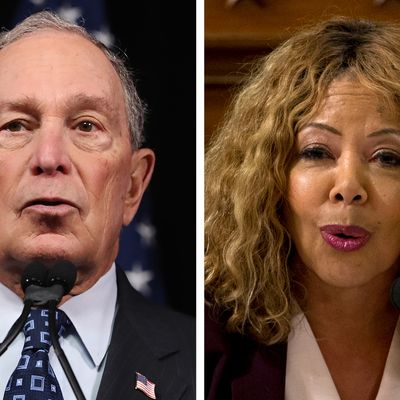
Something happened on February 11 that represented a body blow to presidential candidate Michael Bloomberg’s efforts to overcome a reputation for racial insensitivity, as Politico reported:
Democratic presidential candidate Mike Bloomberg was swiftly condemned Tuesday after a years-old audio clip surfaced in which he appears to discuss in starkly racial terms the “stop-and-frisk” policing practice he presided over as mayor of New York City …
“Ninety-five percent of your murders — murderers and murder victims — fit one M.O. You can just take the description, xerox it, and pass it out to all the cops,” Bloomberg can be heard saying in the clip.
“They are male minorities, 16 to 25. That’s true in New York. That’s true in virtually every city,” the clip continues. “And that’s where the real crime is. You’ve got to get the guns out of the hands of the people that are getting killed.”
The clip seems to have originated from Bloomberg’s speech at an Aspen Institute event in February 2015.
But also on February 11, Bloomberg received a particularly prized endorsement from one of a steady series of African-American pols who have joined his effort: Georgia congresswoman Lucy McBath. The Atlanta Journal-Constitution report on the endorsement speculates about its fortuitous (or entirely deliberate) timing, but notes her support for Bloomberg was totally predictable:
Two years ago, a Bloomberg organization spent more than $4.5 million to help McBath oust Republican incumbent Karen Handel. McBath, whose son was murdered by a gun-wielding assailant, had served as a spokeswoman for the group.
So her support for Bloomberg, who announced his candidacy late last year, has never been in doubt. “Mike gave grieving mothers like me a way to stand up and fight back. Nobody running for president has done more for the gun-violence-prevention movement than Mike,” McBath said in the press release.
It’s a reminder that Bloomberg’s vast investments in advocacy work on gun violence and other issues of interest to African-American leaders, and his campaign spending (particularly in 2018), are offsetting concerns about his record on racial justice as mayor of New York, and about any insensitive things he might have said in Aspen or elsewhere. And there’s nothing corrupt or particularly cynical about that; after all, the presidential candidate whose bond with black voters Bloomberg is challenging, Joe Biden, has his own baggage when it comes to racial sensitivities, as do Pete Buttigieg and Amy Klobuchar, two currently ascendant Democratic candidates.
And so it’s not that surprising Bloomberg has a batch of endorsements from black mayors (e.g., Washington, D.C.’s Muriel Bowser; Columbia, South Carolina’s Steve Benjamin; San Francisco’s London Breed; Little Rock’s Frank Scott Jr.; and Shreveport, Louisiana’s Adrian Perkins), or that he’s running second to Biden among African-American voters according to a recent Quinnipiac national poll. His record and principles aside, African-American leaders focused on electability have to be looking at the campaign infrastructure Bloomberg is building, and marveling at what he might spend on a general election in which his own name is at the top of the ticket. The AJC article on McBath’s endorsement has this tidbit:
Bloomberg has hired about 50 staffers and opened a half-dozen offices around [Georgia]. He’s courted Stacey Abrams and state party chair Nikema Williams.
Georgia doesn’t hold its primary until March 24, three weeks after Super Tuesday. Yet Bloomberg already has been running ads there, and has a campaign presence no other candidate can match.
Indeed, the former mayor may have erred in not jumping into the race earlier, in South Carolina, where Biden appears to be imploding and none of the other candidates have much of a natural connection to a majority-black primary electorate. If my colleague Eric Levitz is right, and we’re hurtling toward a Bernie Sanders–Michael Bloomberg cage fight for the Democratic presidential nomination, black voters may be crucial, and totally up for grabs.






























